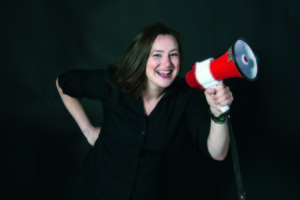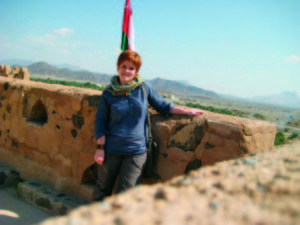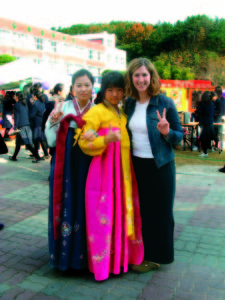A Fulbright scholarship is one of those accolades that universities get really excited about. It’s incredibly competitive. The prestige has global reach. And the award itself — one year teaching or researching abroad — is invaluable to recipients. For these reasons, people take note when a university claims to have a Fulbrighter in their midst.
This year, the University of Louisville can lay claim to 14 Fulbright Scholars so far, with five additional alternates (at time of print). This ranks UofL as one of the nation’s “top producers” of Fulbright scholars, and while this is a big year for the university, it certainly isn’t out of the norm. A total of 103 UofL students have won the Fulbright since 2003, when the university established the Office of National and International Scholarship Opportunities.
Heading up the initiative is Patricia Condon, PhD, director of the Office of National and International Scholarship Opportunities, who is quick to point to UofL’s student population as the key to Fulbright success. “We have top-notch students who are willing to do what it takes to get to the top,” she says.
For these students, the Fulbright isn’t just a line for their Curriculum Vitae. It’s a life-changer. It’s the kind of experience that propels them into action and moves them to do great things. It gives them intellectual energy for the rest of their lives — an energy that ripples through the UofL community. Here are three UofL Fulbrighters. Although their travels, disciplines and personal backgrounds are different, they all have academic grit that makes even the most seasoned pedagogues raise an eyebrow.
Rae Hodge
Research, United Kingdom, 2016-17

Rae Hodge’s passion for journalism is taking her to Cardiff University, where she’ll earn her Master of Science in Computational Journalism.
What led you to UofL and, ultimately, why did you decide to pursue a career in journalism?
“I’ll be honest. I graduated high school by the skin of my teeth from Nelson County High School in rural Kentucky. I took six years after high school to work very, very hard in the real world. I did a string of odd jobs — everything from slinging beer at a biker bar to scrubbing toilets at a nursing home at four o’clock in the morning. I did a lot of manual labor work. I waited tables. The list goes on, but I did it all so I could fund some kind of career in the arts. I eventually started working with a non-profit based out of Bowling Green, Kentucky, that helped students across the country learn about public speaking, speech and debate, and competitive poetry. I got really good at it. We were coaching students so well that they started getting scholarships. And here I’ve never even been to college! So I decided it was time. I went to a community college, worked my tail off and took my 4.0 GPA over to UofL like it was a trophy.”
At what point did you decide to apply for the Fulbright?
“I graduated from UofL in 2013, and I decided to apply for the Fulbright in 2014 and didn’t get it… So I did some research, and I found that a lot of people don’t win their first time around. It’s very common for people to reapply in the first couple years aftergraduation, and Pat [Condon] was crucial in helping me examine my first application. We found the weak spots and polished that rock.“
What will your Fulbright research focus on?
“Basically, I’m going to Cardiff University in the United Kingdom. The program prepares early-career journalists to lead data-driven newsrooms, and it combines project management with big data analysis…If we can’t get into big data and understand it as journalists, we’re in big trouble. It’s an element that has to be introduced into newsrooms if we want to survive. I’ll also be working for the Center for Community Journalism. They’ve been researching how community journalism works in a digital era. Tiny little newspapers are collapsing here. But there, they have a network of small newspapers that are like hyper-local news hubs. I’m excited about it. And I’m excited to bring what I learn back to Kentucky.”
In the short time since you’ve graduated, you’ve been hard at work as a political journalist in Louisville. How does that work inform your upcoming Fulbright research?
“I used to cover the State House, but it’s really difficult for newspapers to pay for a State House Bureau. There used to be a lot of reporters up there — so many you could hardly fit them in a room. Tiny little newspapers all over the state would have a reporter there. Now, there are maybe 12 or 13. Their decreasing numbers means no one is reporting on senators and representatives who are supposed to be representing the interests of people who live a hundred plus miles away from them. No one is reporting on them! How are you supposed to know what your senator is doing if there’s no one holding them accountable? How often are they meeting with lobbyists? What are they voting on? What kind of bills are they sponsoring? When you don’t have someone watching out for local interests, there’s no one there to record the ins and outs of a community. There are serious consequences for that. Plus, I don’t want our history to be lost as we transition over to digital. I don’t want our towns, our countrysides, our people, our identities to be swallowed up. Believe it or not, there are so many similarities between Wales and Kentucky in terms of heritage and history. They have a thriving media ecosystem in an environment that has the same geographic and social problems Kentucky does. They struggle with addiction issues and poverty in certain areas. They have an agricultural economy with an increasing tourism industry, too. So I want to find out what they’re doing to keep their newsrooms alive. What are they doing that we aren’t?”
Ann Merkle
English Teaching Assistantship (ETA), Oman, 2012-13

For Ann Merkle, the Fulbright expanded her comfort zone and sparked an academic fire that’s still burning bright.
What was life like for you before winning a Fulbright?
“I came to UofL in 2009. I moved to Louisville from North Carolina, where I was in the Marine Corps. I was a logistics officer for four-and-a-half years, and I had just gotten back from a deployment to Afghanistan in 2008. I’d been there for quite some time, so when I got back I decided it was time to go back to school. I knew I wanted to study art history, so I applied to the University of Louisville, and, thankfully, I got in. I started my bachelor’s program and went hard and heavy into art history right away.”
How did you find out about the Fulbright?
“I did an overseas study program over the summer with Dr. Greg Hutcheson in Morocco. It was a first year study in Arabic. I worked with him a lot in a seminar on Arab Spain and medieval times. At the end of that program, he asked if I’d heard of the Fulbright, and I hadn’t. So when I got back, I went to see Dr. Condon and she nabbed me right away. We worked very closely together on the application process.”
Why do you think Dr. Condon “nabbed” you? What did she see in you?
“I think she saw my military background, which indicated some level of dedication and focus, I think. Plus she saw that I was studying art history. Those traits together made me a well-rounded, interesting candidate.”
What did the application process involve? What was it like for you?
“It’s extremely intensive. I think one of the reasons UofL is so successful is because of how organized Dr. Condon and her assistant are. I’m a pretty organized person, and if I had to go through that gotten overwhelmed. They’re just so thorough. Even down to proofreading the one-page statement of purpose. I think I had 20 drafts of that thing! And they just pushed me to make it better and better. The whole thing takes up a lot of time, and they make sure you’re committed to it. When you win a Fulbright, you go overseas to represent not just your university, but the United States. And the whole application process, in a way, makes sure you’re ready for that kind of responsibility.”
What was life like in Oman?
“I knew I’d be the only ETA in Oman that year. There were three research Fulbrighters who I was friends with, but they came to Oman much later than I did. They all worked in the capital of Muscat, whereas I was placed in a border town about six to seven hours away from them. Because I had military experience and experience traveling alone, the U.S. Embassy knew I’d be comfortable in an isolated city like Alburaimi. So I taught beginning English at the University College of Alburaimi. I was assigned to the absolute beginning level of fluency. Some students could have a basic conversation with me, while others couldn’t understand a word I said. My Arabic was OK then, but I was encouraged not to speak it with my students.
On the side, I took it upon myself to teach a continuing education language class, kind of like a night school for adults. It was one of the more gratifying experiences I had because I had so many different types of students. I only taught girls at the university. But the night classes were mixed, and I had some variety in age and phases of life.”
Was it tough being geographically, socially and linguistically isolated?
“I was prepared mentally for it. And I was surrounded by colleagues who spoke English, although I was the only native English speaker. So that helped a lot.”
Has the Fulbright played a role in where you are now?
“Absolutely. I’ve always been adventurous, and even this experience pushed the boundaries of my comfort zone. You learn a lot about yourself when you’re living in a tiny city in the middle of the desert, where you don’t know anyone and you have to learn to communicate on your own. Scholastically, it definitely added fire to my intellectual curiosity of material culture in the Middle East. I just finished my Master of Art History in Islamic Art, which I started right after I got back from my Fulbright. The Fulbright, the teaching experience — everything — confirmed it was the path for me. Knowing you’re on the right path is such a good thing.”
Seabrook Jones
English Teaching Assistantship (ETA), South Korea, 2003-04

Seabrook Jones has built a career around her Fulbright experience, and is now taking her own students on study-abroad trips regularly.
When did you first discover the Fulbright Scholarship?
“I still remember my first Fulbright meeting. There were about 10 students there, and Dr. Condon started talking about the Fulbright. I thought it sounded like something I’d like to do. But I had no idea how much that meeting would change my life. I even remember where I was sitting!”
You later went on to work as Dr. Condon’s assistant. What was that like?
“Yes. I worked with her from 2009 to 2012. I learned so much from her. She is just so good at spotting the things that make students unique, and developing that. She helps you understand the special things you need to do to take things to the next level. She’s incredible.”
Was there any part of the application process that you saw as particularly helpful?
“One thing we do that is pretty great is “speed dating.” Basically, we take all of our candidates — usually between 30 and 40 people — and match them up with a big roster of faculty. We’d pick faculty based on their disciplines and experience helping us with Fulbright. So let’s say we have someone going to Brazil. They’d meet with a Latin America specialist. Then they’d meet with a language teacher. Then they’d meet with someone who is maybe a political science professor, but who has lived in Brazil. And let’s not forget, the students are doing a lot of hard work to get to this point. The students have to have the goods. But they get to bring their work to top faculty and get quick, valuable feedback.”
What drove you to apply for an ETA in South Korea?
“Well, before I won the Fulbright, Dr. Condon helped me win a scholarship from the English Speaking Union to study at Cambridge in the summer of 2002. While I was there, I took a course on the Cold War, and I was learning a lot about international relations. One of the things I got really interested in was U.S. intervention in Korea. This was right when we were intervening in Afghanistan, and I started realizing that Korea was a really good example of how U.S. intervention can work well. So I remembered the meeting I had had a couple years earlier and realized that I was ready! I now had an academic interest that would be a great fit for the Fulbright.”
What was life like once you were there?
“While I was there I taught at Pho Hang Girl’s High School. It was just a magical year. I stayed with two home-families, I got to make tons of friends — both fellow Fulbrighters and people who lived there. It was just so great to be so deeply immersed. You can feel changed when you go abroad for a single week. But a whole year? It was just absolutely wonderful. It was a total game changer for me.”
How has the Fulbright been a game changer?
“I’m currently an assistant history professor at Schreiner University in Texas, but I’m also the coordinator for the Global Scholars Program. And what’s really fabulous about my job is that I teach freshman courses that are internationally themed. We also work to internationalize campus by hosting cultural events. Then, in the summer after their freshman year, I take students to South Korea for three weeks. And that’s just so special to me. So when I say that a meeting I had in my junior year was life changing, it really was. Because of the Fulbright, I got into great graduate programs. I’ve had excellent jobs. And now I’m in the process of establishing a Fulbright support program for this small university. It’s like everything I went through has culminated in this wonderful job.”
To read more about the Fulbright program, including a story on Patricia Condon, the director of national and international scholarship opportunities, visit louisville.edu/uoflmagazine to see the entire Summer 2016 issue.





























